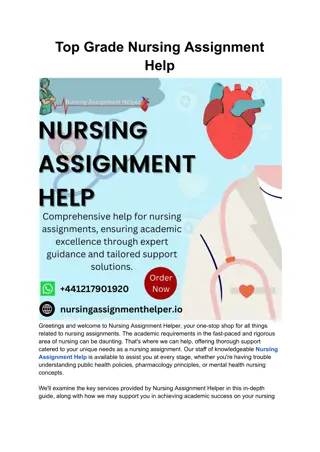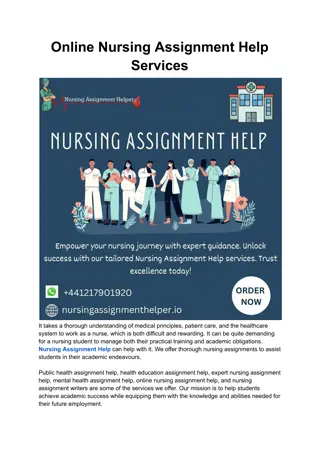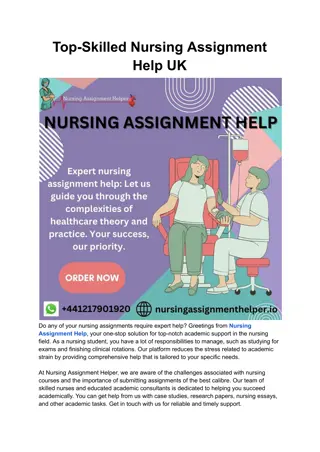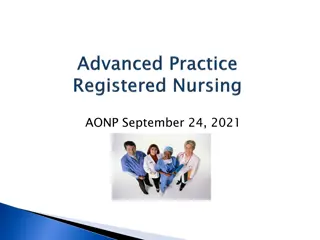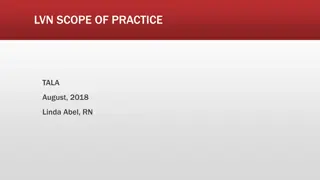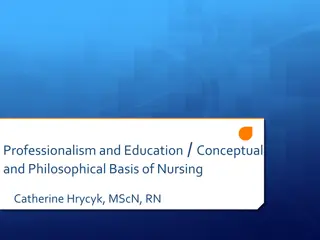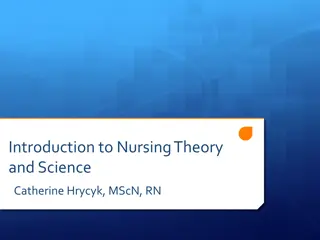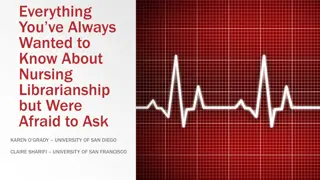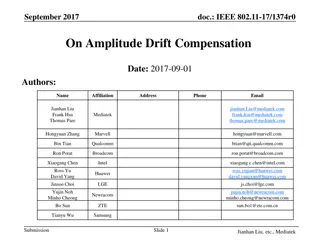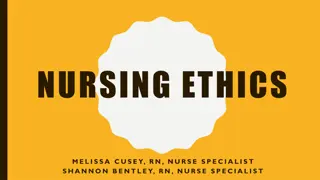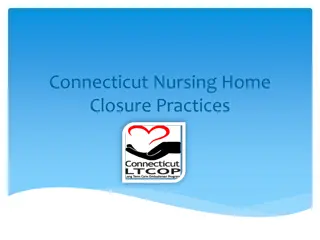Understanding Practice Drift in Nursing: Risks and Consequences
Explore the concept of practice drift in nursing, where nurses may deviate from standards leading to unsafe practice. Learn how to identify and prevent practice drift, understand scope of practice, and adhere to state regulations. Discover the importance of following the Model Nurse Practice Act and Nursing Administrative Rules to maintain safe and professional nursing practice.
Uploaded on Sep 14, 2024 | 0 Views
Download Presentation

Please find below an Image/Link to download the presentation.
The content on the website is provided AS IS for your information and personal use only. It may not be sold, licensed, or shared on other websites without obtaining consent from the author. Download presentation by click this link. If you encounter any issues during the download, it is possible that the publisher has removed the file from their server.
E N D
Presentation Transcript
Staying In Your Lane: Practice Drift Are You at Risk? Melissa Cusey, RN Nurse Specialist Shannon Bentley, RN Nurse Specialist
Objectives At the end of this webinar, you will be able to: Define unsafe nursing practice Identify 3 ways nurses commonly drift outside their scope of practice Find and define your scope of practice
Are you at Risk? Have You Ever? Deviated from the procedure for safe medication administration (5 R s: Right Person, Right Time, Right Dosage, Right Medication, Right Route)? Documented before you did something, but got called away and never preformed the task? Gave medication you did not have an order for thinking the physician will cover you? Borrowed medication from one student to give to another student, and planned on replacing once the medication arrives on center? Breached confidentiality? Practiced outside of your Scope of Practice?
If you answered yes to any of the previous 6 questions, you are at risk of or working outside of your scope of practice, based on your state Practice Act, State Law or Health Code. In this webinar we are going to discuss scope of practice and possible consequences of working outside your scope.
What is Practice Drift? Practice Drift - results when nurses bend the rules, develop a work around, or create a short cut to accomplish a task or solve a problem, that may include skirting written policy or the nurse practice act1.
Model Nurse Practice Act and Administrative Rules
National Council State Board of Nursing (NCSBN) The NCSBN Model Nursing Practice Act (MNPA) and Model Nursing Administrative Rules is the frame work for all state practice acts. Each state board of nursing (BON) uses this model to provide notice, expectations regarding practice. Violations in the practice act may result in unsafe or unprofessional practice3. BONs provide a broad framework for nursing practice and provide notice to nurses as to BON expectations regarding practice. Violations of such standards may result in unsafe or unprofessional practice.
Article II Scope of Nursing Practice Article II. Scope of Nursing Practice3 2.2.1 Standards Related to Registered Nurse (RN) Professional Accountability The RN: Practices within the legal boundaries for nursing through the scope of practice authorized in the Nurse Practice Act (NPA) and rules governing nursing. Bases professional decisions on nursing knowledge and skills, the needs of clients and the expectations delineated in professional standards. Accepts responsibility for judgments, individual nursing actions, competence, decisions and behavior in the course of nursing practice.
Scope of Nursing Practice Article II. Scope of Nursing Practice3 2.3.1 Standards Related to Licensed Practical/Vocational Nurse (LPN/VN) Professional Accountability The LPN/VN: Practices within the legal boundaries for practical nursing through the scope of practice authorized in the MNPA and rules governing nursing. Bases nursing decisions on nursing knowledge and skills, the needs of clients and the expectations delineated by the BON. Accepts responsibility for individual nursing actions, competence, decisions and behavior in the course of practical nursing practice.
Article X Violations and Penalties Article X. Violations and Penalties3 BON can view penalties as misdemeanors, impose civil penalties and or criminal prosecution Article XI. Discipline and Proceedings3 Section 2. Grounds for Discipline. Two of the reasons for discipline are listed below. Unsafe practice/unprofessional practice Unlawful practice
Unsafe practice/unprofessional practice3 Actions or conduct including, but not limited to: Failure or inability to perform registered nursing, practical/ vocational nursing or advanced practice nursing as defined in Article II of this Act and rule, with reasonable skill and safety. Unprofessional conduct, including but not limited to: 1. 2. A departure from or failure to conform to nursing standards. a) Improper management of client records. b) Delegating or accepting the delegation of a nursing function or a prescribed health function when the delegation or acceptance could reasonably be expected to result in unsafe or ineffective client care. c) Failure to supervise the performance of acts by any individual working at the nurse s delegation or assignment. d)
Unlawful practice3: Actions or conduct that include, but are not limited to: Violating a rule adopted by the BON, an order of the BON, a state or federal law relating to the practice of registered or practical nursing, or a state or federal narcotics or controlled substance law. 1. Practicing beyond the scope of practice as stated in this Act 2.
State Practice Acts Nurse practice act is a state law enacted by an individual state s legislature that outlines scopes and standards of practice to guarantee the safe practice of nursing. Each state s board of nursing uses its respective nurse practice act (NPA) to create administrative rules and regulations that define and clarify scopes and standards of practice.
State Nurse Practice Acts (NPA) Every state has their own NPA or Health Code Four states have two NPAs California RN and LVN Louisiana RN and LPN West Virginia RN and LPN Nebraska RN and APN Some states belong to a Nursing Licensure Compact (NLC) where they can practice in more than one state as long as both states participate in the compact.
Responsibility of Nurse Every nurse in the U.S. is responsible for knowing the state s NPA and regulatory requirements for nursing for every jurisdiction in which they hold a license. Since laws, rules and regulations may change over time, it is also necessary to periodically review the NPA that can be found on each BON s website. A violation of the NPA is serious and can result in a complaint being filed with the BON. The BON utilizes its authority to decide whether misconduct or unsafe practice has occurred and what action should be taken. Violations are taken very seriously since they can put patients at risk. This is why every nurse is responsible for understanding his/her scope of practice and other requirements outlined in the law. From: https://www.ncsbn.org/What_Every_Nurse_Needs_to_Know.pdf
Nursing Judgement The NCSBN Model Nursing Practice Act and Model Nursing Administrative Rules makes a statement regarding nursing judgement Nursing judgments and actions include decisions made when delegating nursing tasks to others and providing supervision for those activities. The delegating/supervising nurse is not accountable in the sense of having to stand at the delegate s elbow throughout the activity. The delegating/supervising nurse is accountable for decisions made and actions taken in the course of that delegation/supervision.
Scenario 1 The HWC on your center is open from 7:00 am-5:00 pm. There is only one RN in the HWC (the HWM). All other nurses are LPNs. How will you handle schedules if the NPA requires LPN/LVNs be under Direct Supervision ? After the HWC closes for the evening and on weekends, security and residential staff are instructed to call a HWC staff member if a student has a medical need. The HWC staff member is required to triage the student in this situation. Which staff members should be included in the on-call rotation?
Scenario 2 LPN Susie arrives at work and receives a message that the RN/HWM spent the night in the ER and will not be in today. Susie is a recent graduate from a LPN program, where she learned blood draws in her program, but has yet to preform in the work situation. Today is new input day . The LPN scope of Practice in the state Susie is licensed in requires indirect supervision for tasks the LPN has knowledge and skill in and direct supervision for new tasks not yet preformed. What are some potential ways to ensure that Susie follows the state s NPA?
Scenario 2B Susie tells her CD about her predicament. The CD says, I m sure you can handle it. You need to complete the requirements for new inputs. What should Susie do?
Scenario 3 It is Friday afternoon and new student Laurel who arrived on Wednesday is out of her Adderall 20 mg. You know Stacy was on Adderall and she was sent home on a disciplinary separation. Stacy s Adderall was prescribed by the center physician and the medication was discontinued prior to her separation. You think it will be ok just this one time to take enough medications to cover Laurel for the weekend, until you can get her Rx filled. Why is this not ok?
Scenario 4 Your center physician did not renew their contract and last Friday was their last day on center and you do not have a new physician yet. A new student Tanesha comes to wellness with symptoms of a urgency, blood in her urine, burning and foul smelling urine. You decide to treat her for a UTI. You collect a urine to send to the lab for culture and give Bactrim according to the UTI TG. How is this Practice Drift? What should you have done? Tanesha has an allergic reaction to the Bactrim you gave her. What should you do? Who do you notify of the incidence/error?
Scenario 5 You are in a hurry to go to a doctors appointment, Josh comes to wellness for his Adderall. You give to him his dose and decide you will document on the Controlled Substance Log and on the MAR when you get back from your appointment. When you get back from your appointment you are called into a emergency meeting and then head home for the day. What should you have done?
Scenario 6 The Center has a student by the name of Joshua A. Greene and a new student enrolls in the program and you note his name is Joshua Green as well. Both students are on medications. Joshua A Greene is on an antihypertensive and allergy medications. Joshua Green is on a Prozac and allergy medications. Both students come to wellness for their medications. Neither student has their name tag visible. What steps do you take to prevent an error?
Scenario 7 XYZ Job Corps has a new operator. The former HWM did not stay on but the 2 LPNs did. There are no RNs. What should happen in the wellness center on day one of the new contract?
Scenario 8 The HWM is off sick for the week. The LPN is the only one in Wellness during this time. You live in a state where LPNs/LVNs are not permitted to give OTC medications. Student Mark comes to the HWC complaining of a headache. If the LPN provides Tylenol, how is this considered practice drift? What could the LPN do to help Mark?
Discipline and Proceedings Section 1. Authority. For any one or combination of the grounds set forth below, the BON shall have the power to: a. Refuse to issue or renew a license. b. Limit/restrict a license. c. Suspend a license. d. Revoke a license. e. Place a license on probation or place conditions on a license. f. Reprimand or otherwise discipline a licensee.
Discipline and Proceedings g. Impose a civil penalty not exceeding $10,000 for each separate violation. h. Impose fines. i. Take any other action justified by the facts in the case. j. Recover the costs of the proceedings resulting in revocation, suspension or limitation/restrictions of a nursing license.
Summary Pause to question if you are bending the rules, and if this causes you to work outside your Scope of Practice. Use good Nursing Judgement when delegating tasks. The BON does not care that you had good intentions, when you drifted outside your scope of practice. Violations and discipline are imposed based on the law or rules and not based on good intentions. Be familiar with the ePRH, States Nurse Practice Acts, Make sure your centers Staffing SOPs are approved, and are in congruent with the BON, NPA and Job Corps policy. Document, Document, Document
Summary Continued Make sure you keep current copies of your nurse practice acts for LPN/VNs and RNs in the Health and Wellness Center (HWC). It is required that a copy be printed and available for review by assessor(s) during an assessment. (See Job Corps Information Notice 15-27 Board of Nursing Regulations, Nurse Practice Acts, Pharmacy Practice Acts, and Scopes and Standards of Practice)
During a PCA Compliance will be reviewed during PCA, and if a copy of the nurse practice act(s) is/are not available for review, it will be cited as a concern under 6.12 R5: Professional Standards of Care: All center health staff and providers shall follow accepted professional standards of care and are subject to prevailing state laws.
Resources NCSBN Model Nursing Practice Act and Model Nursing Administrative Rules https://www.apna.org/files/public/Model_Nursing_Practi ce_Act_December09_final%5B1%5D.pdf https://www.ncsbn.org/What_Every_Nurse_Needs_to_Kno w.pdf ePRH, Chapter 6, 6.12, R5
1RN Magazine. Legally Speaking: The problem with breaking the rules. Collins, S.E. (2003, July). 2 Modern Medicine Legally Speaking: The trouble with bending the rules Suzanne Edgett Collins, RN, MPH, JD, PhD, July 1, 2003 3. NCSBN Model Nursing Practice Act and Model Nursing Administrative Rules https://www.apna.org/files/public/Model_Nursing_Practi ce_Act_December09_final%5B1%5D.pdf






